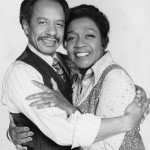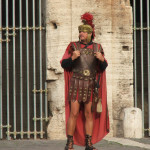Sermon by Randall T. Clayton, Brown Memorial Woodbrook Presbyterian Church, Baltimore, MD. February 26, 2017.
Text: Luke 9:28-45
Decades ago there was a situation comedy called “The Jefferson’s.” The central characters, George and Louise Jefferson, owned a dry cleaning business that had become quite successful. Their success enabled them to move out of their working class neighborhood in Queens (just down the street from Archie and Edith Bunker, by the way) and into the exclusive confines of  the upper east side of Manhattan. “Moving on up to the east side, to a deluxe apartment in the sky, we finally got a piece of the pie,” their theme song said. “Fish don’t fry in the kitchen; beans don’t burn on the grill. Took a whole lotta tryin’ just to get up that hill. Now we’re up in the big leagues, Gettin’ our turn at bat. As long as we live, it’s you and me baby, there ain’t nothin’ wrong with that. Well we’re movin’ on up, to the East Side. To a deluxe apartment in the sky. Movin’ on up to the east side. We finally got a piece of the pie. [“Movin’ On Up”, Ja’net Dubois & Jeff Barry] George was proud of his success, his piece of the pie. His deluxe apartment in the sky certainly underscored his sense that he had finally made it to Gloryland.
the upper east side of Manhattan. “Moving on up to the east side, to a deluxe apartment in the sky, we finally got a piece of the pie,” their theme song said. “Fish don’t fry in the kitchen; beans don’t burn on the grill. Took a whole lotta tryin’ just to get up that hill. Now we’re up in the big leagues, Gettin’ our turn at bat. As long as we live, it’s you and me baby, there ain’t nothin’ wrong with that. Well we’re movin’ on up, to the East Side. To a deluxe apartment in the sky. Movin’ on up to the east side. We finally got a piece of the pie. [“Movin’ On Up”, Ja’net Dubois & Jeff Barry] George was proud of his success, his piece of the pie. His deluxe apartment in the sky certainly underscored his sense that he had finally made it to Gloryland.
I suppose anyone who could own and live in what has been billed as the most expensive house in the United States might also think they were living in Gloryland. According to a recent article in the Los Angeles Times, [“250 Mission Dollar Property,” Los Angeles Times, January 18, 2017, business section] the 38,000 square foot home is listed for sale at a quarter of a billion dollars. The owner of this house will get a fully stocked wine cellar with over 2500 bottles of wine, a 30 car garage filled with expensive automobiles, and be able to enjoy 12 bedrooms, 21 bathrooms, 3 kitchens, a 40 seat movie theater, an infinity pool with a swim up bar and 270 degree hilltop views from downtown Los Angeles to the ocean. The house even comes with a staff of 7 employees to meet the needs and whims of its owners. Surely if you lived there, you might think you were in Gloryland, at least until the electric bill arrived, or you started waking up with arthritis so bad that every movement was painful, or until you looked down the street or deep into your heart and realized the extent of the world’s need.
On this Transfiguration Sunday, we remember a day when some of Jesus’ disciples must have felt that they had arrived in Gloryland as they witnessed some events on a mountain top that were nothing short of glorious. Their impulse at that moment was to build some houses for those present on the mountain, perhaps deluxe houses at that; but that moment on the mountain top slipped away quickly, and soon they found themselves following Jesus on a journey that would lead to rejection and betrayal, death and finally a glorious resurrection.
Jesus invited his inner circle of disciples — Peter, James and John — to spend some time in prayer with him. And as was his habit sometimes, Jesus chose to get away from the crowds for prayer time, and so he led these three disciples up a high mountain for their talk with God. By the time that the disciples got to that mountain top they were tired and sleepy struggling to stay awake, but thankfully for them and for us, they were able to fight the drowsiness and keep their eyes open and see the glories God had in store for them.
with him. And as was his habit sometimes, Jesus chose to get away from the crowds for prayer time, and so he led these three disciples up a high mountain for their talk with God. By the time that the disciples got to that mountain top they were tired and sleepy struggling to stay awake, but thankfully for them and for us, they were able to fight the drowsiness and keep their eyes open and see the glories God had in store for them.
Struggling to stay awake, they suddenly saw that Jesus’ appearance had changed, and it did so without the aid of a barber, plastic surgeon, and personal fitness trainer. His face changed, and his clothes became dazzling white. And while that was glorious enough, standing beside this glowing Jesus were two of the greatest people in their history, both of whom had been dead for generations: Moses and Elijah. Now truth-to-tell, both of their deaths had been somewhat mysterious. Scripture indicates God had buried Moses when he died but the location of his grave was never disclosed. And Elijah had been “taken up” into heaven. Given the nature of their deaths, and the way God had used them in the past, it was believed that both men would return to earth at the time that God was ready to send the Messiah to announce the Messiah’s coming. So that day on the mountaintop with Moses and Elijah talking to a transfigured Jesus the disciples must have felt as if they had finally made it to Gloryland.
Peter’s impetuous response was to offer to build some houses. One for each of them in fact. Perhaps he wanted all of them to be comfortable; perhaps he wanted to enshrine that moment and hold onto it forever; or perhaps he just said the first thing that came out of his mouth. We  really don’t know his motivation, but whatever the reason for his desire to build some nice homes for all three, while he was speaking a cloud enveloped them all. And as God had done in times past, God spoke in the midst of that cloud. In a voice that was unmistakably God’s, the disciples heard God say: This is my Son, my Chosen; listen to him.” And then (snap fingers), it was over. The cloud disbursed. Moses was gone. Elijah disappeared. And once again Jesus looked just like the man whom they had followed up the mountain and into Gloryland that day.
really don’t know his motivation, but whatever the reason for his desire to build some nice homes for all three, while he was speaking a cloud enveloped them all. And as God had done in times past, God spoke in the midst of that cloud. In a voice that was unmistakably God’s, the disciples heard God say: This is my Son, my Chosen; listen to him.” And then (snap fingers), it was over. The cloud disbursed. Moses was gone. Elijah disappeared. And once again Jesus looked just like the man whom they had followed up the mountain and into Gloryland that day.
Having experienced Gloryland, and with a new assurance that Jesus was the Messiah, as they journeyed down the mountain perhaps they began to wonder if they had misunderstood what Jesus had said just a few days prior about the Son of Man undergoing suffering, and about his rejection and death. With memories of that Gloryland experience fresh in their minds, perhaps they figured that Jesus had either misspoken about what was to come, or they had misunderstood Jesus’ comments about followers denying themselves about followers taking up crosses daily; and perhaps they expected when the next day dawned that their lives would suddenly be easy, that their cupboards would fully stocked, and their enemies would be subdued, and they too would acquire a deluxe apartment in the sky or a home with 270 degree views of city and sea.
But at the foot of the mountain they met a man whose only son was very, very sick. The man begged Jesus to look at the child who was convulsing, foaming at the mouth, shrieking. Apparently the disciples had been unable to heal the man’s son, but he said he was hoping Jesus could. And Jesus did.
Witnessing God’s love, power, and might in that healing, the disciples must have felt at that moment like they were in Gloryland again. Indeed, seeing the father’s face and the son’s peaceful body must have been a glorious moment and given them the assurance that all would really be right with the world and that the Messiah was truly present. But then, that glorious experience ended abruptly when Jesus said, “Let these words sink into your ears: The Son of Man is going to be betrayed into human hands.” And soon thereafter, Jesus set his face toward Jerusalem where he would encounter the worst the world could throw at anyone.
Jesus left the mountain where he had conversed with Moses and Elijah and he sloughed through a world that turned its back on the poor, and he offered hope and called his followers to show mercy and kindness. Jesus came down the mountain and into a world that crushed the spirits of those without voice, and those without standing, and he welcomed all of those, embracing them, standing up for them, inviting those of us who follow him to do the same.
Jesus didn’t ensconce himself in a house that spoke of power and success and he didn’t leave his disciples there either. But rather Jesus took up the cause of those who were oppressed, offering wholeness, peace and dignity to those his culture did not and he says to us, do likewise.
And it may be that as we do likewise we will begin to see at least some hints of Gloryland along the way. You see, I think it’s possible that as we protest actions and policies the hurt the vulnerable we just might get a glimpse of Gloryland in seeing prospects begin to emerge for a world that values all people and insures that all have enough. It’s possible that as we undertake concrete actions to protect God’s creation from the ravages of industry and careless neglect we will see some hints of hope in the actions of others who are joining us in this world. I think if we look, it’s possible to find hints of the joy and peace and wholeness that God has promised even in our daily lives…Perhaps we experience such a moment as we pass the peace with someone worshipping here; or perhaps we experience it as we take food or flowers to one who is mourning, as we hold the hand of one who is dying, or in the countenance of a transgender high schooler who discovers we accept them and will stand up for them against all who would bully or demean them.
Instead of staying up on a high mountain removed from the world’s need, or ensconced in a place that seems safe and secure and allows us to ignore the world’s need, Jesus calls his disciples off the mountain top and into the world, where we can meet the Jesus who journeys with us, and who has broken the power of death, destroyed the power of evil, and who invites us to lift up a cross, and carry it for the sake of those in need in our world.
Yes, in this world at the base on the mountain we will encounter pain and struggle, and no, we may not end up feeling like we have our piece of the pie. Yes, we will see sickness and hunger and violence and division. Yes, we will even need to endure change that is not always wanted and leaves us feeling uprooted; and no, as followers of Christ, we will not be walled away from the world. But if we keep our eyes open, our hearts receptive, and our hands engaged in Christ’s service, I suspect we will also encounter a little bit of Gloryland along the way, at least enough to get us through. Amen.




